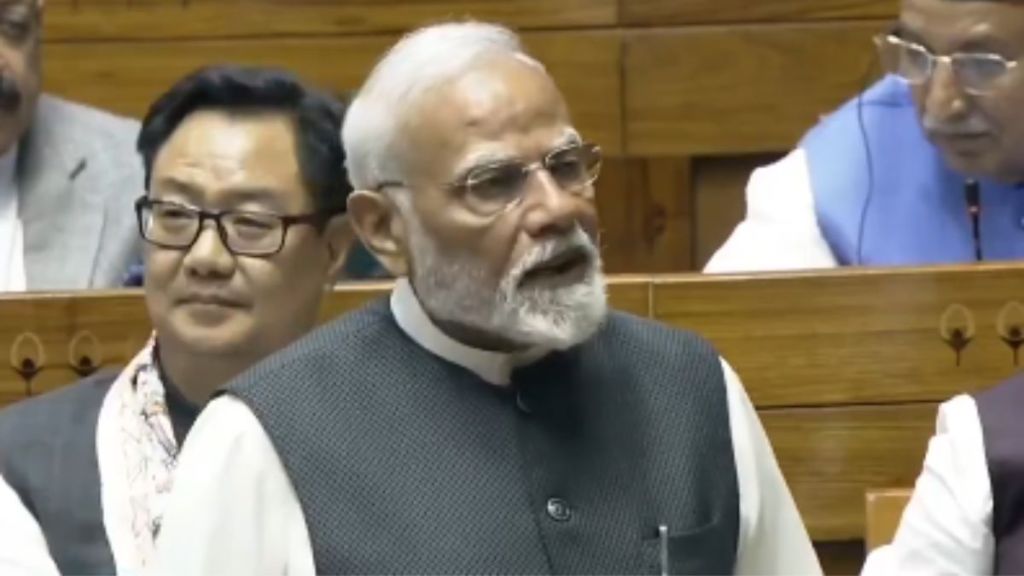On the eve of the Delhi elections, Prime Minister Narendra Modi launched a scathing attack on both the Aam Aadmi Party (AAP) and Congress, with veiled references to Rahul Gandhi. While responding to the debate on the Motion of Thanks to the President’s Address in the Lok Sabha, Modi sharply criticized AAP and its promises, stating that “some parties are like ‘AAP-da’ for the future of the youth,” accusing them of making empty promises ahead of elections but failing to deliver on them.
Modi’s ‘Sheesh Mahal’ jibe at Kejriwal
PM Modi highlighted his government’s fiscal responsibility, claiming that while their schemes saved significant public funds, they were not used to construct ‘Sheesh Mahal’—a pointed reference to extravagant spending by some political leaders. In what seemed like a dig at AAP convenor Arvind Kejriwal, Modi criticized those who indulge in luxury, such as “jacuzzi and stylish showers,” while his government’s priority remained on providing water to every household.
Modi’s veiled criticism of Rahul Gandhi
Without directly naming Rahul Gandhi, Modi mocked those who visit the huts of the poor for “photo sessions,” remarking that such people would find discussions about poverty in Parliament “boring.” His comments appeared to be directed at Gandhi, who has previously been seen engaging in such interactions with the poor.
Modi also targeted certain opposition leaders, accusing them of using the rhetoric of “urban naxals.” He claimed that such individuals, who speak the language of urban naxals, cannot grasp the importance of the Constitution or the unity of the nation. While he refrained from mentioning Gandhi by name, this remark seemed to reference Gandhi’s earlier comment about “fighting the BJP, the RSS, and the Indian State.”
Modi brings in Rajiv Gandhi
In another jab, Modi alluded to former Prime Minister Rajiv Gandhi, who had famously spoken about India entering the 21st century. Modi criticized him for being so disconnected from reality that he couldn’t meet the needs of the 20th century.
Modi also praised his government’s initiatives, particularly the Ayushman Bharat scheme, aimed at providing health benefits to the poor. He lamented that certain states have blocked the scheme, causing hardship for vulnerable citizens. Additionally, he pointed out tax reforms, noting that while in 2002 there was no tax on incomes up to Rs 2 lakh, under his government, the exemption limit has been increased to Rs 12 lakh.
Here are the key highlights from PM Modi’s reply on the Motion of Thanks to the President’s Address in the Lok Sabha:
- Some people feel they are not mature enough if they don’t talk about foreign policy, even at the cost of the nation.
- If you cannot respect a woman President from a poor family, it is fine. But what all is being said to insult her (Draupadi Murmu). Why?
- We started Ayushman Bharat for poor, but some states have stalled the scheme, leaving poor people in hardship.
- Some people chose the path of tushtikaran (appeasement); we have chosen santushtikaran (satisfaction for people). The real social justice, secularism and respect for the constitution is 100-% saturation of schemes.
- Before 2014, there were 387 medical colleges in India. Today, there are 780 medical colleges. The number of seats has increased with more medical colleges. Before 2014, there were 7700 SC seats in medical colleges; now the number is 17000.
- Those who walk with the constitution in their pocket do not know how they had compelled Muslim women to live a life full of trouble. By ending instant triple talaq, we have given Muslim women their rights.
- When power is made hereditary, democracy ends. We built the Statue of Unity for Sardar Patel, who united the country, despite the fact that he wasn’t from the Jana Sangh.
- Some leaders speak the language of urban naxals, and talk of waging war against the Indian state, they cannot understand the Constitution.


